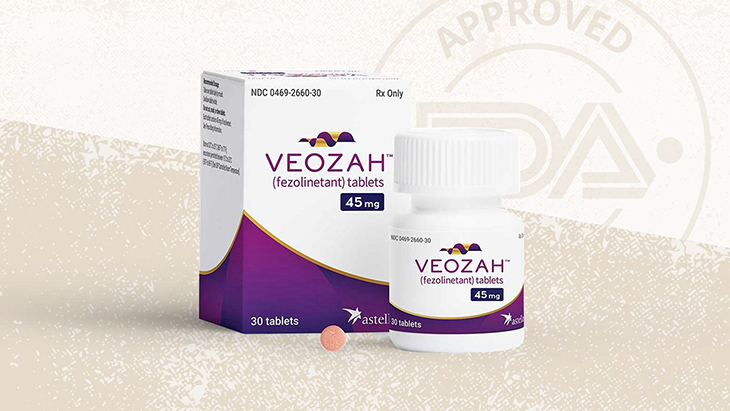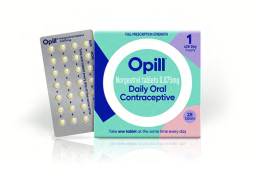
When it comes to menopause, not all women choose to manage their hot flashes, a common symptom of menopause, with hormones. Rather, they are forced to choose other alternatives that tend to be much less effective. However, there is now a new alternative.
The U.S. Food and Drug Administration (FDA) has recently given its approval to fezolinetant, marketed as Veozah, a nonhormonal remedy designed to alleviate hot flashes. Developed by Astellas Pharma, Veozah is the second nonhormonal option to receive FDA clearance for addressing this common menopausal symptom, with early research indicating its potential in reducing both hot flashes and night sweats.
JoAnn Pinkerton, MD, a professor of obstetrics and gynecology and the director of the midlife health center at University of Virginia Health in Charlottesville, says, “We need better nonhormonal therapies for those women who can’t or who choose not to take hormone therapy.”
According to a book published by StatPearls in 2022, more than one million American women begin menopause each year. This occurs when the estrogen levels of a female drop, causing menstruation to stop.
When the production of such hormones like estrogen and progesterone decrease in the years leading up to menopause, as well as afterwards, many women experience a large variety of symptoms as a result. These include mood swings, vaginal dryness, joint pain, memory problems, and insomnia.
Among these, vasomotor symptoms, namely hot flashes and night sweats, affect approximately 75 percent of women undergoing menopause, says the North American Menopause Society (NAMS).
Dr. Pinkerton explains that the precise cause of hot flashes and night sweats is still unknown, but it is believed that the decline in estrogen levels disrupts the brain’s temperature regulation mechanisms. Veozah represents a novel approach to addressing this issue, as it is the first drug within a new category of medications known as neurokinin 3 receptor antagonists. These drugs aim to block the brain’s hypothalamus region, which is responsible for the body’s internal thermostat.

For women prescribed Veozah, doctors recommend taking one 45-milligram (mg) pill once daily, with or without food. They also recommend taking the pill at the same time each day. The medication is expected to be available in pharmacies within the next three weeks, with a monthly supply costing approximately $550. The company also plans to introduce a financial assistance program to make the drug more affordable.
Does Fezolinetant Work Well?
Published in February 2023 in the Journal of Clinical Endocrinology and Metabolism, a pivotal late-stage trial of fezolinetant took place involving 500 menopausal women who experienced an average of at least seven moderate to severe hot flashes daily when they joined the study.
After 12 weeks of treatment, those taking the lower dose of fezolinetant experienced a reduction in the average daily number of hot flashes, from 11.2 to 4.8, eliminating 1.9 more daily episodes than the placebo. Participants on the higher fezolinetant dose saw their average daily hot flashes decrease from 11.8 to 4.5, eliminating 2.5 more episodes than the placebo.
A separate late-stage trial published in The Lancet in March, reported similar results in about 525 participants experiencing moderate to severe hot flashes. They were randomly assigned to receive either a placebo or one of two fezolinetant doses for 12 weeks. Compared to the placebo, the lower fezolinetant dose reduced the average daily number of hot flashes by 2.4, while the higher dose reduced it by 2.6.
While no head-to-head trails have compared fezolinetant to hormonal therapies for hot flashes, the results from these late-stages trials suggest that the drug may offer similar benefits in terms of reducing the frequency and severity of hot flashes. Moreover, fezolinetant appears to be more effective than the only other FDA-approved nonhormonal option for hot flashes, paroxetine (Brisdelle), though direct comparisons between the two have not been conducted.
Belonging to the family of medicines known as selective serotonin reuptake inhibitors (SSRIs), paroxetine was originally developed to treat depression. It can also eliminate about one hot flash per day more than a placebo, says an analysis published in British Journal of Obstetrics and Gynecology (BJOG). Despite an independent FDA advisory panel recommending against the approval due to limited effectiveness, the FDA approved the drug anyway.
Is Fezolinetant Safe?
According to the results published in April 2023 in Obstetrics and Gynecology, a yearlong safety trial with over 1,800 participants found that most side effects of fezolinetant were mild or moderate. But one of the most common side effects experienced by participants was headaches, felt by around 9 percent of those taking fezolinetant, similar to the proportion of participants on placebo with this symptom.
However, there is a warning for elevated hepatic transaminase (liver injury), so individuals prescribed Veozah should undergo liver function tests before starting the medication and continue to have routine bloodwork every three months for the first nine months of use.
This safety study also examined the potential for changes in endometrial tissue that might indicate an elevated risk of uterine cancer and reductions in bone density that could lead to an increased risk of fractures. Fortunately, there were no significant changes in endometrial tissue or bone health associated with the treatment.
On the other hand, paroxetine has been associated with a rare increased risk of fractures, along with other rare side effects such as an increased risk of suicidal thoughts and bleeding, according to FDA safety information.
For most women below the age of 60, hormone therapy is safe and effective for hot flash when taken within the first 10 years of menopause, explains Makeba Williams, MD, an associate professor and the director of midlife and menopause medicine at the Washington University in St. Louis School of Medicine.
The Fear of Hormone Therapy Still Remains
Despite the availability of effective treatments available for menopause symptoms, fear of hormone therapy still remains among many women because of the concerns coming from the 2002 Women’s Health Initiative (WHI) study. This landmark study linked certain estrogen and progestin treatments to an increased risk of heart attacks, strokes, and breast cancer. Although subsequent analyses have indicated that the benefits of hormonal therapy outweigh the risks for most women, the shadow of the WHI results continues to deter many women from considering hormone therapy, says Dr. Williams.
According to NAMS, hormone therapy remains the most effective option for managing hot flashes. However, women over 60, who face an increased risk of heart attack and stroke, and individuals with a history of breast cancer are advised against using hormones for menopause symptoms.
Despite the availability of effective treatments, a 2021 independent survey found that three out of four women experiencing hot flashes and other menopause symptoms choose not to seek treatment, in part due to lingering safety concerns stemming from the WHI study.
Williams adds, for any woman worried about the risks of hormones, fezolinetant may very well be the next alternative. She explains, “I see fezolinetant becoming a first-line option for women with moderate to severe vasomotor symptoms who have a contraindication to or an aversion to hormone therapy.”



